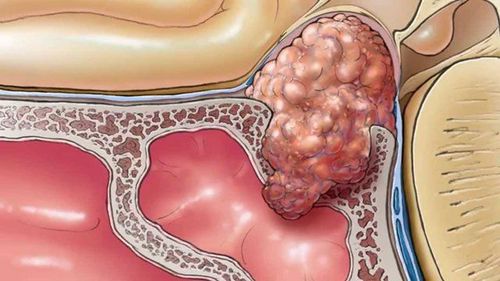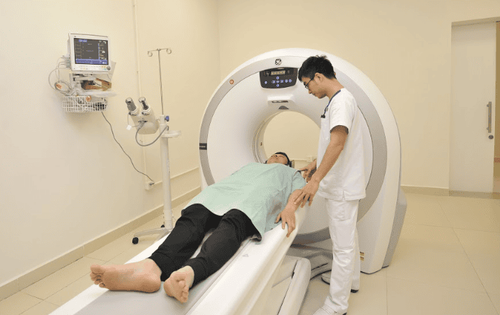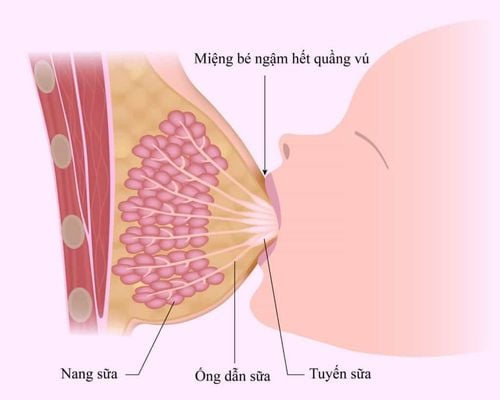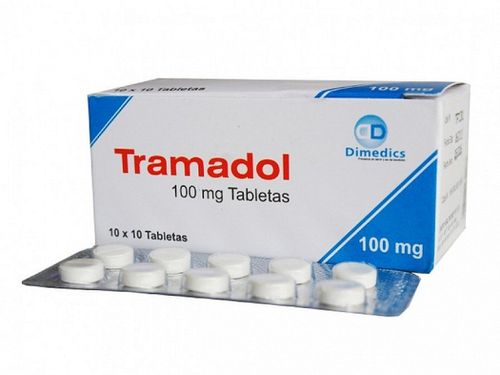This is an automatically translated article.
A pituitary tumor is an abnormal growth of a tumor in the pituitary gland, a part of the brain responsible for regulating the body's hormonal balance. When the tumor compresses the surrounding structure, it can cause headaches and reduce vision.1. What is a pituitary tumor?
The pituitary gland is a small, bean-shaped gland located at the base of the brain, slightly behind the nose and between the ears. Despite its small size, the pituitary gland affects almost every part of the body. The hormones it produces help regulate important functions, such as growth, blood pressure, and reproduction.A pituitary tumor is an abnormal growth of a tumor in the pituitary gland. A part of the brain responsible for regulating the balance of hormones (hormones) of the body. But the very appearance of a pituitary tumor can lead to the overproduction of hormones that control the body's functions. Or conversely, some pituitary tumors appear, causing the production of hormones to be less, resulting in the body not having enough of the necessary hormones.
Most pituitary tumors are benign (non-cancerous, also called adenomas). The adenoma will still exist or grow in the pituitary gland or surrounding tissues but will not spread to other areas of the body.
This disease is quite common. According to many studies, 1 in 10 adults has a pituitary tumor. But most of these pituitary tumors are very small, have no clinical symptoms or never show any signs and do not require treatment. The percentage of patients with pituitary adenoma requiring treatment is very low. Pituitary tumors account for 25% of surgically operated intracranial tumors.
2. Causes of pituitary tumors
Pituitary adenoma is a disease that until now has not been able to determine the cause of the disease. But besides that, according to the assessment of major scientists in the world, this disease is caused by genetic factors.
Bệnh u tuyến yên là bệnh gì?
The genetic disorder is one of the causes of this disease.
Hormones produced by the pituitary gland that help regulate a number of important functions such as growth and reproduction.
This disease occurs to any age, including the elderly, especially those with a lot of hormonal genetic factors, yeast 1.
In yeast 1, the endocrine system will appear tumors in various glands. Changes in genetic factors will be one of the reasons for pituitary tumor development.
Factors that increase the risk of pituitary adenoma
Although the specific cause is still unknown, there are many factors that can increase the risk of pituitary adenoma, including:
Age: Disease Pituitary tumors can occur at any age, but are most common in the elderly. Heredity: It is more common in people who have a family member with multiple endocrine neoplasia type 1 (MEN I). People with MEN 1 when tested will find many tumors appearing in different glands in the endocrine system. There is now a genetic test to diagnose the disease.
3. Symptoms and signs of pituitary tumor
The signs and symptoms of a pituitary tumor will vary from person to person, depending on the size of the tumor, its location, the type of hormone secreted by the tumor, and the degree of tumor growth. .. But usually will still recognize through the following symptoms:
Chụp cộng hưởng từ (MRI) giúp phát hiện và chấn đoán bệnh u tuyến yên chính xác
3.1. Hormones play an important role, so endocrine disorders can seriously affect the entire body.
Increased prolactin secretion causes the patient to lose menstruation, delay menstruation, menstrual disorder, infertility, breast milk secretion (even though not pregnant, no period). In some cases, patients who go to infertility treatment for many years are discovered to have prolactin-secreting pituitary adenomas. Male patients may experience decreased libido, decreased or lost erections, and impotence. Increased secretion of growth hormone (GH) causes many other developmental disorders in patients such as acromegaly, large face, wide forehead, protruding forehead, wide chin, thick lips, rough skin, feet and toes big, big hands and fingers... Looking at the face of a patient with GH-secreting pituitary gland tumor (Acromegaly) is very special. The patient can be diagnosed immediately by observing the face. ACTH-secreting pituitary adenomas (adeno, cortisol, trophi, hormones) cause Cushing's syndrome. At this time, the patient often has signs of weight gain, stretch marks on the abdomen, thighs, arms... flat muscles, big belly, small limbs. Signs of hypopituitarism: Tumors of the pituitary gland that do not increase secretion press on healthy pituitary cells, causing hypopituitarism, reducing the secretion of hormones, causing symptoms such as impotence, infertility, hair loss, loss of appetite, fatigue, dry skin, growth retardation or delayed puberty in children... Some cases of bleeding in pituitary tumors can cause acute pituitary insufficiency with signs of hypopituitarism appearing quickly, severe headaches. severe headache, rapid blurred vision. Hypopituitarism due to bleeding pituitary tumor is a neurosurgery emergency that needs to be treated quickly, correctly and promptly. 3.2.Visual disorders The pituitary tumor is located right in the pituitary, below the optic nerve (where the two optic nerves cross), so when the tumor is large, it compresses it, causing visual disturbances such as blurred vision, semi-fragile (only one can see inside or outside). With hemiparesis, the patient can only see the image in front of the face, can't see things outside the temple (temporal hemiparesis), or can't see objects inside (nosular hemopia). .
Some patients can notice signs of semi-fragility, some are only discovered by the doctor when going to the doctor. Tumor invades to the side (into the cavernous sinuses) causing strabismus, double vision, facial numbness...due to compression of nerves III, IV, V.
3.3.Increased pressure in the skull It is an increase increased pressure in the brain. It may be due to increased fluid around the brain tissue.
Symptoms of increased intracranial pressure are headache, nausea, increased blood pressure, decreased consciousness, shallow breathing, coma...
Increased intracranial pressure has many dangerous complications such as: injury permanent brain damage, prolonged coma, and even death. Therefore, as soon as the signs of injury in the skull are detected, the patient needs to go to the nearest medical facility for timely treatment.
4. Prevention of pituitary tumors
The best method to prevent pituitary adenoma is to find measures to support good health, a healthy lifestyle, a reasonable diet:
A reasonable diet, full of nutrients nutrition, eat a lot of vegetables. Limit the use of stimulants, alcohol, beer, and tobacco Periodic health check-up so that disease can be detected and treated in time Get enough sleep Keep your mind relaxed, avoid stress Have an exercise regime regular sports Hopefully the above information helps you better understand pituitary tumors. See your doctor right away if you notice signs and symptoms that are similar to pituitary tumors or if you have a family member with a pituitary tumor. Because the location and medical condition can be different in each person, it is necessary to discuss with a doctor to determine the method of diagnosis, treatment and treatment.
Vinmec International General Hospital is one of the hospitals that not only ensures professional quality with a team of leading medical doctors, modern equipment and technology, but also stands out for its examination and consultation services. comprehensive and professional medical consultation and treatment; civilized, polite, safe and sterile medical examination and treatment space.
In April & May 2021, when there is a need for examination and treatment of pituitary tumor at Vinmec Central Park International General Hospital, customers will enjoy double incentives:
- Free specialist examination
- 50% discount for customers with post-examination treatment indications. The program is limited to the corresponding technique of each hospital and to customers who perform this treatment technique for the first time at Vinmec.
Please dial HOTLINE for more information or register for an appointment HERE. Download MyVinmec app to make appointments faster and to manage your bookings easily.













